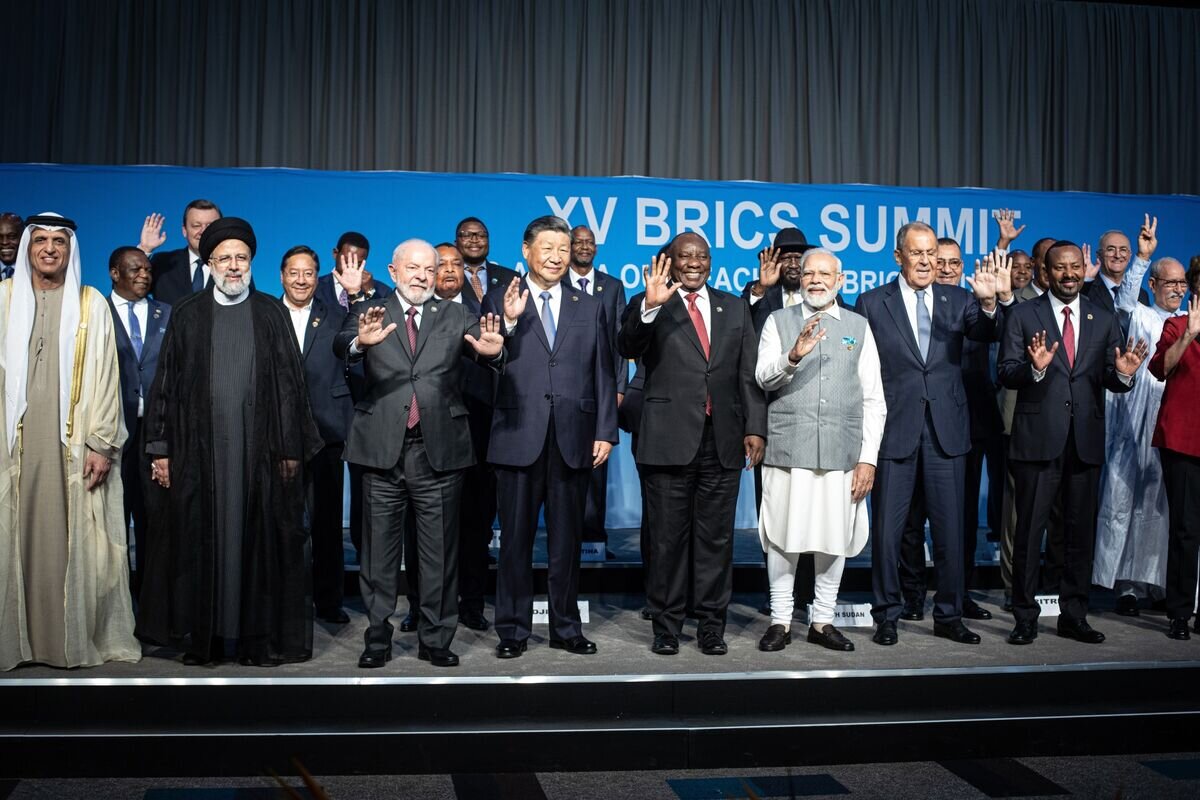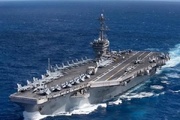Argentina, Egypt, Ethiopia, Iran, Saudi Arabia, and the UAE have officially been invited to join the BRICS group of emerging economies in the recent meeting held in South Africa's Johannesburg. Iran's accession to the BRICS group, which has so far included Brazil, Russia, India, China and South Africa, is being hailed as a strategic success for its foreign policy in the face of illegal sanctions by the United States.
BRICS is developing internal institutions for integration and increasing effective economic power in order to support the development programs of its members and strengthen their regional and international position.
The establishment of financial institutions independent from Western institutions can be considered the most important success of BRICS in promoting convergence and its most important advantage in the new global economic structure.

To shed light on the issue, we reached out to Mehmet Ogutcu Chairman of the London Energy Club and former OECD executive and Turkish diplomat.
How do you assess the capacity of the BRICS to affect the existing world order and push the world towards a new multipolar world order in the future? And why are so many countries, including many US partners, participating in this project?
I am not sure whether we can call the bloc of nations known as the BRICS taking the step of inviting six new countries for membership as a historic one. As economic tensions soar and geoeconomics becomes a battleground, the BRICS group is emerging as the “OECD of the Global South”.
In terms of purchasing power parity, the BRICS are slightly larger than the G7. But, because their currencies trade at prices far below their PPP levels, the group remains significantly smaller than its advanced-economy counterpart, when measured in current nominal US dollars. China has firmly established itself as the world’s second-largest economy.
In nominal terms, its GDP is more than three times larger than Japan and Germany, and around 75 percent the size of the US. Meanwhile, India has been growing fast and now seeks to become the third-largest economy by the end of 2020s. But none of the other BRICS has performed anywhere near as well as these two. Brazil and Russia account for around the same share of global GDP as they did in 2001.
Still, the new bloc would collectively represent 46 percent of the world’s population and contribute 37 percent of global GDP when measured at purchasing power parity.
Many countries of the Global South see their preferences and interests underrepresented or ignored in the world order as currently constitutedThere is a search for new initiatives to respond to the needs and challenges of the Global South. The G-7, G-20, OECD and others are not considered to be representing the global interests. Many countries of the Global South see their preferences and interests underrepresented or ignored in the world order as currently constituted. Additionally, aligning with organisations like BRICS does not mean binding commitments to one side of the new Cold War. The Shanghai Cooperation Organization (SCO) may be a security cooperation forum like NATO but it lacks any Article 5 feature.
China and Russia have decided to expand the group to grant it greater weight in international affairs. Over 40 countries have expressed interest in joining the BRICS group with 22 formally requesting membership. The BRICS grouping of Brazil, Russia, India, China and South Africa has now been joined by Saudi Arabia, Iran, Ethiopia, the United Arab Emirates, Argentina and Egypt. We need a new name for expanded BRICS. Further expansions of an organisation many have touted as a systemic rival to the G7 seem almost certain to follow in future summits.
There are those who think we are amid a new Cold War. Even members of the US Congress have lent credence to that concept. But that is not a good analogy, in my view. China is a peer economy to the US and is likely to overtake it in gross domestic product (GDP) soon, while the former Soviet Union’s economy was, at its peak, only a third that of the US. But what is critically different in the global landscape of alliances is that many countries can choose their alignment.
While the global economy’s centre of gravity was in the Atlantic, between the US and Europe, in 1980, it had moved 7,725km to Izmir, Turkey, by 2008 and will likely lie somewhere between India and China by 2050. This new environment presents the nations of the Global South with options about how to respond to growing friction among major powers and how to position their nations amid great power competition.
The global economy’s centre of gravity will likely lie somewhere between India and China by 2050Today, the rising power balancing the US is not looking to form a Soviet-type bloc. The reasons are both material and ideational. China does not have the military capacity to project power over large parts of the planet and make security guarantees to faraway friends. Beijing has many partners, even “comprehensive strategic partners”, but no allies.
The inclusion of more countries, especially major commodity exporters like Saudi Arabia, Iran and the United Arab Emirates, may make greater economic integration among BRICS states and the use of non-dollar currencies in trade among them more appetising. As the BRICS are, except Russia, energy-deficit nations, the expansion has been characterised by some analysts as “BRICS+OPEC” with energy-rich Iran, Saudi Arabia and the UAE joining the Club.
However, in today’s world, I believe that joining a forum like the BRICS, the Asian Infrastructure Investment Bank, the SCO is less a declaration of alignment with Beijing and more an assertion by a country that they wish to remain neutral or play both sides in line with their specific national interest. It is not a black-white fanatic club membership.

How do you see the future of the bloc and its enlargement?
Clearly, the BRICS’ symbolic power will grow with new expansion. The group has been able to tap into the broader Global South’s suspicion that post-World War II global-governance organizations are too Western. It has occasionally been able to present itself as the voice of the emerging and developing world – a category that of course excludes the US and other advanced economies. Insofar as it has reminded everyone that the structure of international institutions does not reflect the global economic shifts over the past 30 years, it has succeeded.
Argentina, Egypt, Ethiopia, Iran, Saudi Arabia, and the United Arab Emirates are now in. But the questions remain: On what criteria have they been admitted? Why are Indonesia, Mexico, Turkey, and Nigeria not in as they are bigger and more powerful economies? I think we will know more about these questions and new aspirants soon.
I think that an increasingly large coalition of countries with competing and conflicting political systems, ideologies and approaches to the West may produce not a new bloc.
Will the new currency planning work? Has the US policy of using the dollar and sanctions as a weapon against its rivals and even allies forced other countries to look for new currencies and methods to reduce their dependence on the US dollar?
One big issue is the dominance of the US dollar. It is not especially healthy for the world to be so dependent on the dollar and, as a corollary, on the US Federal Reserve’s monetary policy. The introduction of the euro could have diminished the dollar’s dominance if eurozone member states had agreed to allow their financial instruments to be liquid and large enough to appeal to the rest of the world.
Similarly, if any of the BRICS – especially China and India – undertook significant financial reforms to achieve that goal, their currencies would almost certainly become more widely used.
The US dollar’s supremacy and US global leadership have been increasingly questioned since the 2007–2008 global financial crisisThe US dollar’s supremacy and US global leadership have been increasingly questioned since the 2007–2008 global financial crisis. The fact that this crisis originated in the US raised concerns about the reliability of Washington’s leadership and the rationality of preserving the dollar’s hegemonic position in the global financial system. This crisis also created an opportunity for rising powers to seek greater status and representation in global governance.
China and Russia seem intent on using a larger BRICS forum as a focal point of their efforts to cut their dependence — and that of the global economy — on the US currency that has dominated cross-border invoicing and settlements since World War II. They are already conducting most of their trade in local currencies, especially the Chinese Yuan. Russia has pitched for a new BRICS currency, perhaps backed by gold, that would be used as an international medium of exchange between the members instead of the dollar.
For Russia and China, de-dollarisation has taken on fresh importance as they’ve increasingly come under sanctions from the West. Fear of how Western economic statecraft can damage their economies and limit their national security autonomy is a major issue of debate in both Moscow and Beijing. Now in Tehran too as a new member. While South Africa, Brazil and India have better relations with the West, they too see lesser reliance on the dollar as being a positive for their economic growth and trade potential.
To them, de-dollarisation is less about overthrowing the “King Dollar” from atop the hierarchy of reserve currencies and more about carving out a separate method to transact between member states without the need for the dollar, the Western-based SWIFT messaging system and the services of New York banks.
The BRICS track record on de-dollarisation has been mixed. China and Russia have successfully reduced their dependence on the dollar for cross-border trade. On the other hand, the New Development Bank, established by BRICS in large part to facilitate the de-dollarisation of state lending is largely dependent on the dollar and is now struggling to raise that currency due to having Russia as a founding member.
We should readily admit that the stability of the dollar and deep dollar-denominated markets allow for predictability, ease of use and lower cross-border transactions. True, a new BRICS currency may address some of these challenges but certainly not all. Where sanctioned countries like Russia and China, as well as new members like Iran, are eager to deter the US from its ability to impose costly financial sanctions, others will be less inclined to bear the cost of such a transition.

Would the BRICS nations’ New Development Bank (NDB) function better?
NDB was celebrated as a chance for countries across the Global South to break free of the US-dominated IMF and World Bank and rewrite the rules of financing global development. But while the number of nations signed up to the NDB has almost doubled since its founding, critics say that the BRICS bank is making many of the same mistakes as the institutions it was supposed to replace.
Critics of the current crop of multilateral development banks such as the World Bank have accused them of having privileged the financing of extractive, export-oriented projects across the developing world that ravage the environment while doing little to build up domestic industry. The IMF has come under criticism for its structural adjustment programmes of the 1980s, which imposed trade liberalisation, privatisation and austerity measures on lower-income countries across Africa as borrowing conditions.
The NDB and its accompanying Contingent Reserve Arrangement – an agreement among the countries’ central banks for mutual support during currency crises that was modelled on the IMF – had been born out of frustration with years of failure to reform the US-dominated institutions. The idea behind the NDB was to create a bank that had greater equality among its shareholders, could hopefully make decisions more quickly and make more loans in local currencies.
Founding NDB and other institutes are about changing the paradigmThese institutions are not replacing the IMF and World Bank but providing additional space – if you compare the NDB to the World Bank, it is a much smaller institution. New financial institutions, whatever their ambitions, still must survive in a world shaped by the demands of private capital markets and the judgement of credit rating agencies. That is the reality.
Therefore, to my mind, it is not about creating another institution. It is about changing the paradigm and changing the framework through which credit risk is assessed. But this change is unlikely to come from a business-as-usual approach.
To be blunt, existing financial realities cannot be altered in the near term. Moreover, the potential benefits of de-dollarization will come at a cost. BRICS would face significant separation costs, with the most immediate ones being increased costs of cross-border transactions, more expensive capital raising in the dollar-based global markets, and reduced competitiveness of their firms in foreign markets due to a shortage of dollar funding.
Hence, it must be a smooth process without fundamentally disrupting the existing order.

Recently Iran joined the BRICS, How significant is the achievement?
Russia’s stance is unequivocal; it is locked in a high-stakes confrontation with the West, particularly the United States. In recent years the relation of Iran and Russia has deepened significantly including military ties. China has also chosen to extend its unwavering support to the Iranian government.
Membership of Iran in BRICS after joining the Shanghai Cooperation Organisation is indeed a diplomatic victory for Tehran. Iran could benefit on two fronts when its membership in BRICS begins in January 2024. Both from a political standpoint and economic standpoint.
Let’s not be too optimistic because some BRICS members closely allied to the US may remind us from time to time that BRICS’ decisions need unanimous agreement.
Membership of Iran in BRICS after joining the Shanghai Cooperation Organisation is indeed a diplomatic victory for Tehran From an economic standpoint, Iran could broaden its trade relations with the BRICS member states. This potential would be particularly advantageous if Iranian government could sell oil at its desired volume. Practically speaking, the US faces a significant challenge in imposing sanctions on several nations once they are engaged in trade with Iran, as BRICS will collectively represent nearly half of world’s population.
However, a particularly notable challenge emerges from US sanctions which would prevent Iran from selling oil in US dollars.
The idea of de-dollarization and the creation of a common currency has gained traction. Iran still has the potential to boost its oil and non-oil exports to BRICS members using the Chinese yuan, local currencies, and barter arrangements. This strategy could mitigate a substantial portion of the pressure stemming from US sanctions. The influence of the Chinese yuan might grow, especially considering that five nations that will be in BRICS —Argentina, Brazil, Iran, Russia, and Saudi Arabia—already include yuan in their payments. Nonetheless, economists indicate that the US dollar will likely maintain its dominance among the BRICS countries.
Interview by Zahra Mirzafarjouyan
























Your Comment